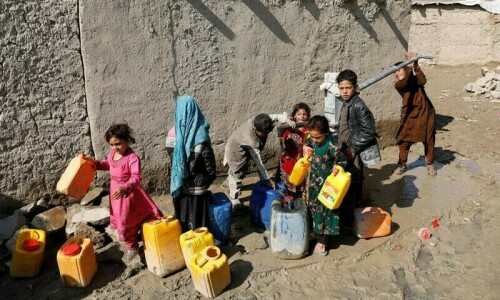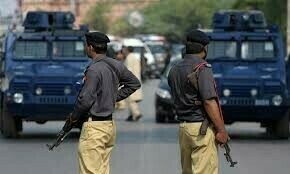KARACHI: Pakistan Peoples Party leader Senator Taj Haider claimed on Sunday that the mortality rate among children in Tharparkar was lower than the rest of the country because of relief measures taken by the provincial government in the draught-hit area.
Speaking at a press conference here on Sunday, Senator Haider, who is also the coordinator of the Tharparkar Relief Committee, said that the mortality rate among children in Tharparkar was between 45 and 50 per 1,000 lives compared to 65 per 1,000 lives in other parts of Pakistan.
Accompanied by PPP leaders Habibuddin Junaidi and Zulfiqar Kaimkhani, he termed all media reports regarding deaths due to drought in Tharparker unfounded and asked the media to take his party’s point of view before publishing and broadcasting such reports.
He presented a detailed report about relief efforts and the development projects being carried out in Tharparker and said that PPP chairman Bilawal Bhutto-Zardari was also monitoring all relief works and developments activities.
He said that so far over 56,000 wheat bags had been distributed among the drought-affected families and all basic health units in 50 union councils of the district had been activated under the public-private partnership, while taluka and district headquarters hospitals were being upgraded.
Senator Haider said that the PPP after getting the portfolio of the health department (from the Muttahida Qaumi Movement) posted 20 more doctors to Tharparker and they would serve in the district for at least three years. “It is because of these measures that the children’s mortality rate has come down to 45-50 in Tharparkar against 65 [in rest of Pakistan] per 1,000.”
However, he conceded that these figures were not satisfactory, but it was to some extent improvement compared to the past.
Terming non-availability of water one of the biggest problems in Thar, he said that the government was working on different projects to solve this issue by utilising subsoil water reserves, which is about 1.5 billion acre feet.
He said that it would not only solve the drinking water problem but water would also be available for cultivation.
He recalled that during the last tenure of the PPP government, 70 reverse osmosis (RO) plants were installed in Thar. The plants were now converted on solar energy and 25 more RO plants would become operational by the next month, he added.
Referring to the efforts for cultivation in Thar, he said that under a public-private partnership 34 water pumps were being installed by Engro, four of them had already been installed and each pump could bring under cultivation 100 acres of land.
Published in Dawn, November 3rd, 2014
















































